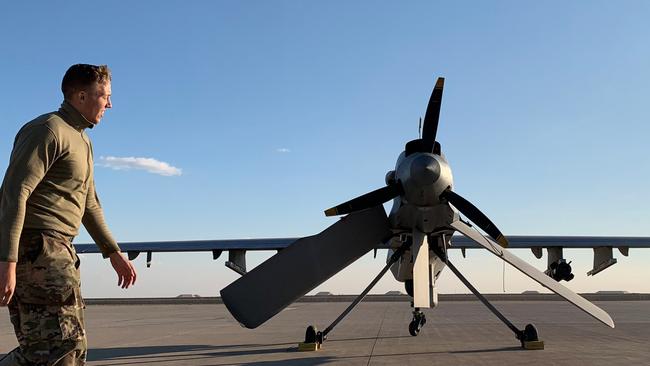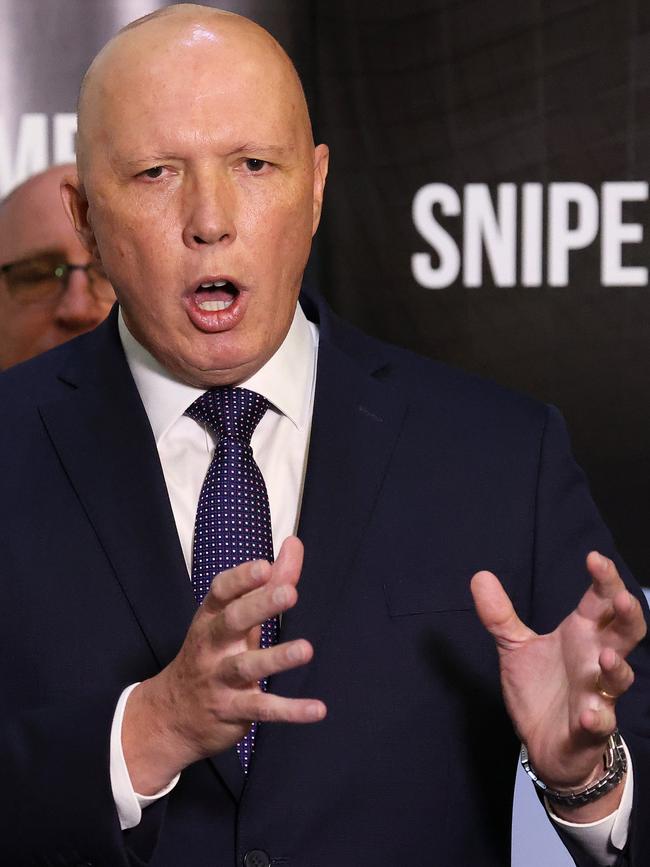Defence in ‘urgent need of new weapons’, says key Australian exporter
One of Australia’s key defence exporters says the next federal government must overhaul Defence’s $270bn procurement system.

One of Australia’s biggest defence exporters says the next federal government needs to overhaul Defence’s $270bn procurement system to prioritise urgently needed weapons and equipment over “exquisite” capabilities that take decades to arrive.
EOS Defence global chief executive Grant Sanderson said Defence’s 40-year-old acquisition model was less focused on addressing immediate strategic threats than on “deploying something that is imperfect”.
EOS is a leader in space systems, remote weapons systems, and battlefield communications, earning 95 per cent of its revenue from exports.
Mr Sanderson said as a Canberra-based company, EOS was committed to the Australian market, but “inertia” in Defence’s procurement system made it “one of the most expensive and energy-sapping places in the world to do business”.
While the 2020 Defence Strategic Update warned Australia could no longer rely on 10 years of “strategic warning time” before a major attack, Defence’s decades-long procurement timelines had not changed to reflect the acknowledged threat, he said.
He highlighted the fact that Australia had no contracts to acquire armed drones, or counter-drone technology, which can deliver huge “asymmetric” advantages to smaller forces, as the conflict in Ukraine had shown.
“We’ve got into the habit of thinking that we can’t have military capability that doesn’t take decades,” Mr Sanderson said.

Defence Minister Peter Dutton has acknowledged the need to fast-track capability acquisitions, revealing earlier this month that $3.5bn in long-range strike missile purchases would be brought forward by up to five years.
But neither the Coalition nor Labor has pledged reforms to the Integrated Investment Program that governs Defence acquisitions.
Mr Sanderson said under the IIP, Defence was prioritising projects “which you would have to question the return” on, ahead of “capabilities that we don’t have”.
“I don’t think there is an army in the world right now that is not looking at loitering munitions, and suicide drones, and drone swarms, as something that they all need, he said. “Logically, it should be a priority for us as well.”
His comments follow the cancellation of the $1.3bn SkyGuardian armed drone program, and the dumping of the French Attack-class submarines at a cost of $5.5bn.
The nation’s $45bn Hunter-class frigates are unlikely to be operational until 2033, while the next government is also due to award a $25bn-plus contract for new infantry fighting vehicles that won’t be delivered until the 2030s.
Mr Sanderson compared Australia’s approach to Israel’s rapid procurement model, which focused on getting new capabilities into soldiers’ hands to deal with immediate threats even if they were not fully developed.
“Everywhere you go where they don’t have decades of time up their sleeves, they do it differently,” he said.
“The different models are there. We understand them. The biggest barrier to learning those lessons just seems to be the inertia of our process.”
On a visit to Australia last week, the Commandant of the US Marine Corps, General David Berger, said technology was moving so fast “it is difficult for our processes to keep up”.
General Berger, who is implementing sweeping reforms to the Marines to prepare for amphibious warfare in the Indo-Pacific, said he was working to overcome bureaucratic resistance to deliver new capabilities to Marines as rapidly as possible to ensure they were ready to meet future threats.
“I have got to get equipment in the hands of Marines as soon as possible,” he told the Australian Strategic Policy Institute.
“You get tools in soldiers and marines and sailors hands early on, they don’t need a two-week class to learn how to use them.”




To join the conversation, please log in. Don't have an account? Register
Join the conversation, you are commenting as Logout